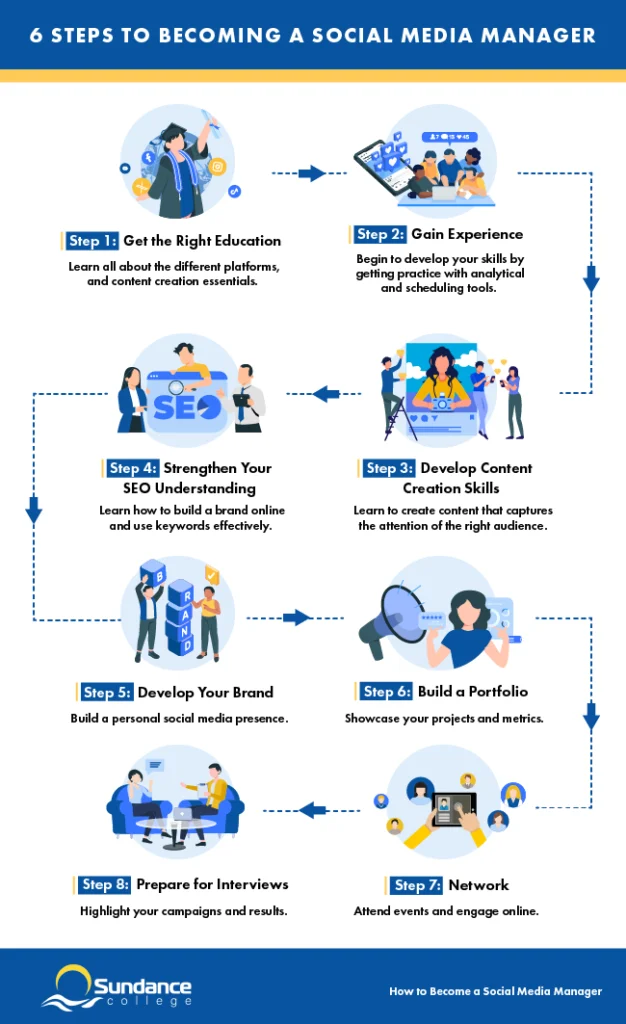Blog / Become a Social Media Manager
Become a Social Media Manager

Digital Marketing and Social Media Management Diploma
- Digital Marketing Assistant/Coordinator
- Advertising Account Executive
- Marketing Assistant/Coordinator
- Content Marketer
Table of Contents
With social media playing a central role in connecting brands to audiences, a career in social media has become an exciting prospect for many individuals. Becoming a successful social media manager requires more than enthusiasm, creativity, and technical know-how – it requires training and practical experience.
While understanding your audience and the different social platforms is essential, what will truly set you apart in this field is your ability to apply trained knowledge and skills, stay ahead of trends, and build upon your robust network of industry peers.
Whether you’re just getting started or looking to advance, this article will show you how to build a successful career in social media management.
Listen To: How to Become a Social Media Manager


Become a Social Media Manager
Sundance College Podcast
4 November 2024
STEP 1: Get the Right Education in Social Media Management
The right education is foundational to building a successful career as a social media manager. Your education should help you develop:
- Platform Expertise: Effective social media management involves more than a surface-level knowledge of popular platforms; it’s about understanding the nuances of each one to connect with your audience. Through a career-focused program, you’ll work hands-on with various social media platforms, exploring a range of digital marketing tools and strategies that build strong connections with customers.
- Content Creation Skills: Writing search optimized content for various devices, creating compelling experiences, and scripting narratives are invaluable skills in social media roles. In a specialized program, you’ll learn these techniques, mastering the art of creating engaging, audience-centered content that resonates with online viewers, whether it’s for posts, stories, or video content.
- Brand Presence Know-How: Building brand presence goes beyond posting regular updates. A well-rounded program covers essential digital strategies, including SEO (Search Engine Optimization), PPC (Pay-Per-Click) advertising, and backlinks, to improve brand visibility and engagement. You’ll learn how to create accessible, optimized content that meets business goals and ranks on search engine results pages (SERPs).
Look for courses or resources that cover the essentials of digital marketing, including social media algorithms, audience targeting, and content optimization. A career-focused educational foundation is what will set you up to create effective strategies that resonate with audiences.
STEP 2: Gain Practical Experience in Social Media Management and Analytics Tools
Understanding social media management tools is crucial for tracking and optimizing marketing campaigns. Analytics tools like Google Analytics, Hootsuite, and Facebook Insights are essential for monitoring audience engagement and refining your strategies. Familiarizing yourself with tools like these will allow you to adjust campaigns based on data and trends, as well as give you valuable experience in adapting to real-time changes.
Practical experience with these tools through, for example, a practicum experience within your studies will help you interpret data effectively, manage content schedules, and track campaign success. This means you’ll have a competitive edge when entering the job market and set yourself apart from candidates who have only classroom learning, so you can hit the ground running in your new career.
STEP 3: Develop Strong Content Creation and Copywriting Skills

Creating content that captures attention is one of the key skills of a social media manager. This involves more than just posting updates – it’s about telling a story, building a narrative, and tailoring content to fit each platform.
Practice writing clear, engaging copy for different formats, from Instagram captions to LinkedIn articles. Experiment with video storytelling, try storyboarding ideas for reels or short clips, and work on designing graphics that visually convey your message. Developing these skills not only helps you engage audiences but also positions you as a versatile creator in the field.
STEP 4: Strengthen Your Understanding of SEO and Brand Strategy
An effective social media manager understands how SEO and brand-building efforts contribute to online visibility. Basic SEO knowledge allows you to optimize social media posts for discoverability, so that content reaches the right audience. Understanding brand strategy also helps you create a comprehensive online presence, aligning your social content with broader business goals.
Learning how to use keywords effectively, researching audience preferences, and creating engaging visuals all play a part in building a strong online presence. By strengthening your knowledge in these areas, you’ll add significant value to your role.
STEP 5: Develop Your Personal Brand Online

Today, personal branding is more crucial than ever. Your personal social media accounts should genuinely reflect who you are, highlighting your professional skills, values, and interests.
Start with your LinkedIn profile — it’s your first impression online. Share insights that highlight your expertise, connect with industry professionals who inspire you, and engage in meaningful discussions. By actively contributing to conversations in your field, you’ll establish yourself as a thought leader.
But don’t stop there. Platforms like Instagram, X, and TikTok are great ways to demonstrate your expertise. Regularly post content that showcases your knowledge and creativity. Engaging with your audience and sharing industry trends helps build your personal brand, positioning you as an active, informed social media professional.
STEP 6: Build a Portfolio that Showcases Your Social Media Content Work
Creating a social media portfolio is your chance to highlight the depth of your experience and the results you’ve achieved. Begin with a brief introduction that captures your journey, whether through personal projects or practicum work. This introduction provides context for the work you’ll be presenting.
When organizing your portfolio, choose platforms like WordPress or Behance that visually showcase your standout projects. Select key campaigns where your contributions led to measurable success. Include performance metrics such as engagement growth, audience reach, or conversions to emphasize the results of your efforts.
As you walk through each project, detail your approach from concept to execution. Describe the challenges you faced and the strategies you used to overcome them, demonstrating your problem-solving abilities. Be sure to incorporate testimonials or feedback to reinforce your credibility. Finally, summarize your strengths and keep everything well-organized and easy to explore.
STEP 7: Network with Industry Professionals and Explore Job Opportunities
Networking is an important step in any career, and social media management is no different. During your studies and practicum experience, you’ll have plenty of opportunities to meet people in your field, whether it’s through collaborating with classmates, instructors, or working with other professionals. These early connections can become valuable parts of your professional network.
Events like SocialWest and DigiMarCon offer opportunities for meeting industry leaders, attending workshops, and learning from experts. Additionally, joining groups such as the Canadian Internet Marketing Association and participating in discussions on LinkedIn can further expand your network and increase visibility.
When it comes to job searching, platforms like Indeed Canada and LinkedIn Jobs regularly list openings for social media managers across various sectors, from tech startups to established companies. Having a strong network helps you stay informed about these opportunities as they arise.
STEP 8: Demonstrate Your Social Media Expertise in Interviews
In interviews, it’s important to clearly communicate your hands-on experience in social media management. Employers want to see candidates who not only understand social media concepts but have successfully applied them. Come prepared with specific examples of campaigns you’ve led, whether from your practicum work or personal projects, and focus on the results you achieved.
For instance, if you’ve run a campaign that increased engagement or drove website traffic, use metrics to demonstrate your impact. Tailor your examples to show your adaptability across platforms. Whether it’s creating compelling Instagram content or leveraging LinkedIn for business outreach, demonstrating your versatility will set you apart from other candidates.
By highlighting measurable results and your strategic approach, you can effectively convey your value to potential employers.

Becoming a successful social media manager involves prioritizing education, gaining practical experience, and developing your personal brand. By following the outlined steps, you’ll be well on your way to reaching your career aspirations.
If you’re interested in taking the next step or learning more about this career path, connect with our admissions advisor, who can guide you on your journey toward becoming a skilled social media professional.
Related Blogs
Subscribe for more career advice
Blog Categories
Share on:
